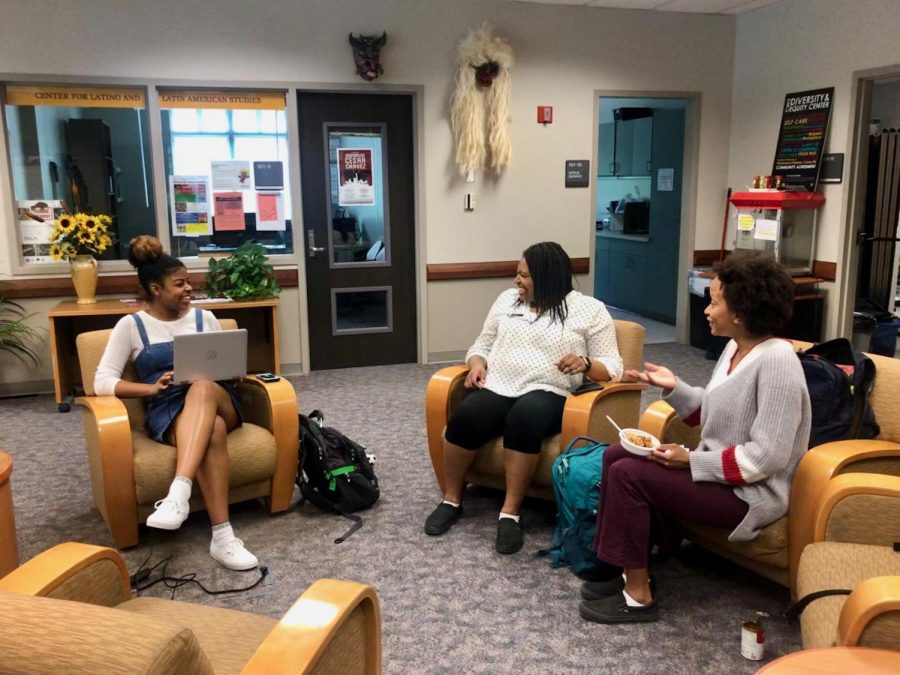Volunteer opportunities tie students to community
The Diversity and Equity Center is located in room 101 in Black Hall. One of the purposes for the center is to create a safe space for students to socialize and relax before, after and between classes.
April 17, 2019
Making new friends, learning a new skill and giving back to the community are some of the benefits that CWU students say they received from volunteering, either on campus or in their hometowns.
Harry Engel, a fifth-year majoring in accounting and finance, was among those who have benefited.
“I learned to have a greater appreciation of the environment around Yakima and Ellensburg,” Engel said.
Engel said he volunteered for the Yakima River Cleanup several times over the years, “picking up trash, moving wood and debris.”
At CWU, the Center for Leadership and Community Engagement (CLCE) and the Diversity and Equity Center (DEC) are some of the hubs on campus that offer various volunteer opportunities.
Food banks, blood drives, Earth Month programs and the International Café are some of the events that the CLCE helps to organize.
Kristin Kensrud is a senior double majoring in accounting and in leadership and management. Kensrud is also a program leader at CLCE.
“There are so many broad opportunities,” Kensrud said. “Kind of blended in to help connect with different students that you normally wouldn’t, that are outside of your major, outside of your friend group.”
Kensrud added that CLCE is also a place that offers workshops to help develop and hone leadership skills.
Kensrud said that before she came to CWU, she first got introduced to the CLCE through the Experience Leadership Project (ELP).
ELP is a four-day camping trip in the Cascade Mountains that helps incoming first-year and transfer students develop a support network with CWU and faculty members and learn leadership skills.
“The ELP was a little nerve-wracking, but it definitely stretched [me],” Kensrud said. “And I felt more equipped as a first-year student.”
CLCE also offers more extended programs like the annual Cross Cultural Leadership Program (CCLP), which brings students together in a year-long cohort to explore the relationship between culture and leadership.
Kensrud said her cohort travelled to New Orleans to practice what they had learned as a conclusion to the program.
“[The ELP and the CCLP] were pretty transformational to my experience at Central,” she said. “And attending the community engagement events, it’s really cool to see Central come together and support our community and give back to them.”
The DEC is located in room 101 in Black Hall. The center provides programs and events with a focus on topics such as diversity, cultural identities and minority issues.
Thao Luu is a senior in computer science and carries out public relations and marketing for the DEC.
“We try really hard to create a safe space [here],” Luu said. “It’s where people can just hang out.”
Luu said she first heard about the DEC as a freshman and started volunteering at events such as Haru Matsuri and PolyFest.
“It was a good step away from my major, to do something extracurricular that’s [different].” Luu said. “And one of the perks was attending the event and meeting people who were also active and cared about the same issues that I cared about.”
Paige Hall is a sophomore majoring in family and child life, with a minor in Africana and black studies. She is a program coordinator at the DEC.
Hall said when she was a freshman, she didn’t know anyone or the resources on campus.
“I knew where I felt welcomed, and who was a friendly face to see,” Hall said. “And [the DEC] was a very welcoming environment, very positive and open and friendly.”
Hall said that last year, she had to file volunteer hours when she was a treasurer of the Black Student Union (BSU), and she saw an opportunity at the DEC.
“It was very fun, it didn’t seem like it was work,” Hall said. “It was more like hanging out, getting to know people.”
But at first, Hall said, she felt shy and scared.
“It takes a lot of courage to get out of your comfort zone, because you’re in a very new environment, but I’d say just go for it,” Hall said. “That’s what worked for me… It opened a bunch of new doors.”
Luu said that knowing about resources are integral to the wellbeing of college students, especially for someone entering a new space.
“A lot of times, people say you go to college for school, yes, but you also need a foundation to support you throughout school,” Luu said.



